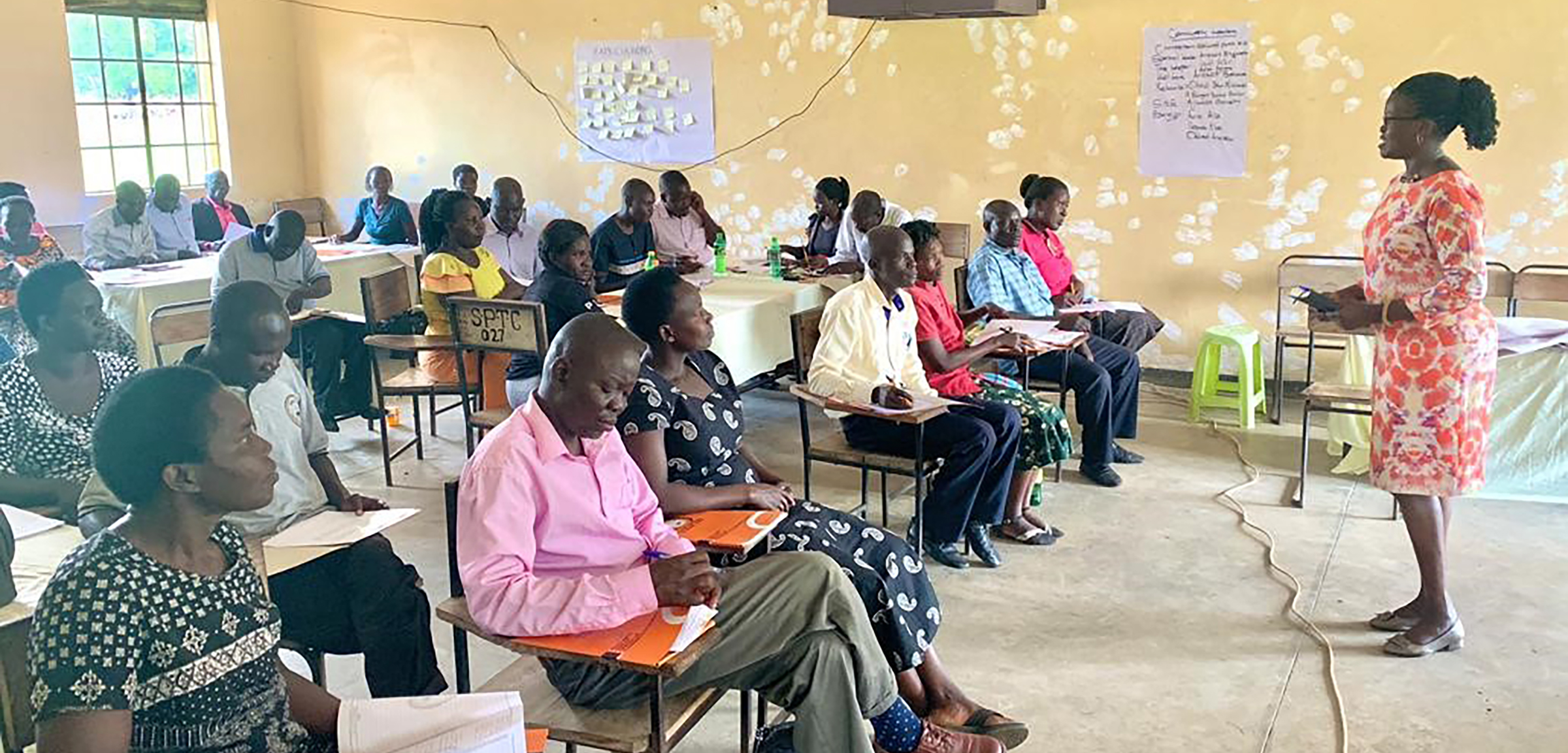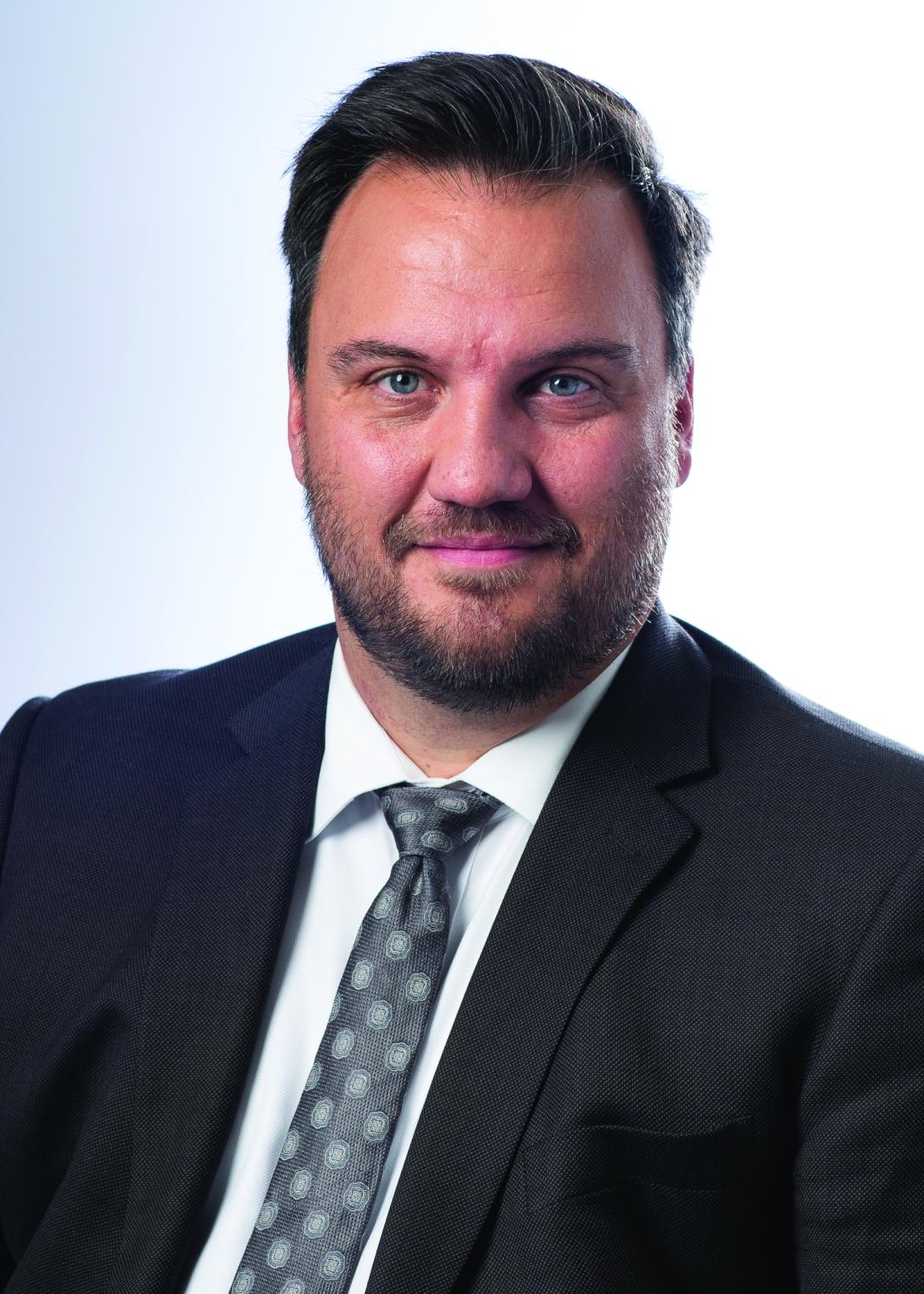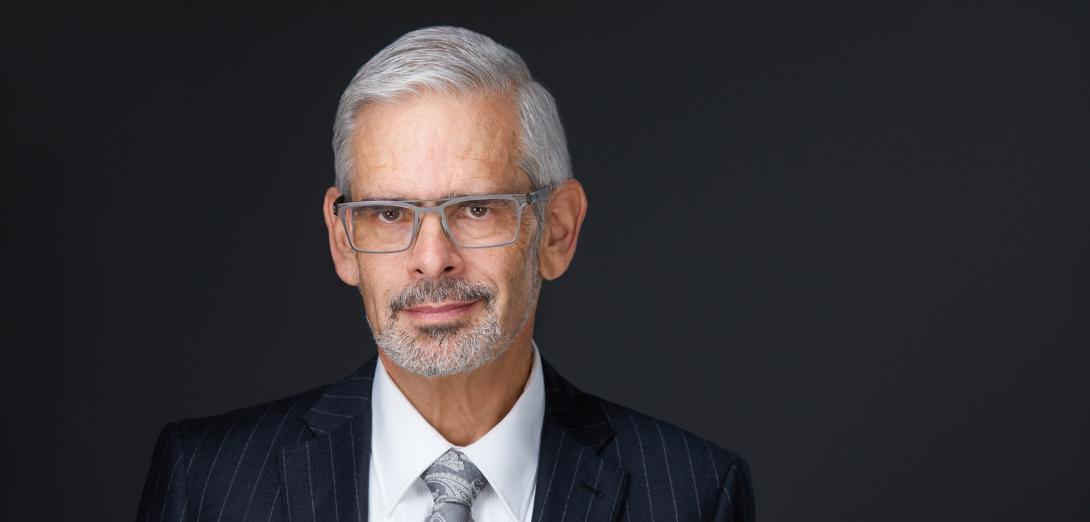This past summer, 10 Alberta teachers participated in Project Overseas. Here are some first-person accounts of their experiences.
Solidarity in Uganda
This summer two teams of Canadian teachers including three ATA members partnered with the Ugandan National Teachers’ Union (UNATU) to lead professional development workshops in two different regions of Uganda through the Canadian Teachers’ Federation (CTF) Project Overseas.
Participants engaged in programming that included leadership development, classroom management, learning modalities and instructional strategies. Canadian teachers co-facilitated the workshops while paired with a Ugandan teacher trainer (called tutors) from a local teacher college.
In a country with half of its 45 million inhabitants under the age of 14, public schooling is a major focus. Schools in Uganda have very large class sizes, with an average of 84 students per teacher. The team visited a local public school where there were over 200 Grade 3 students in a single classroom. Nationally, the goal is to have class size targets closer to 53 students per teacher.
By the end of the workshops, all participants appreciated having the time to come together as professionals and collaborate on ways to build on practices to support all learners, in Canada and in Uganda.
- Stephanie Clements
President, Calgary Public Teachers Local No. 38
What an opportunity
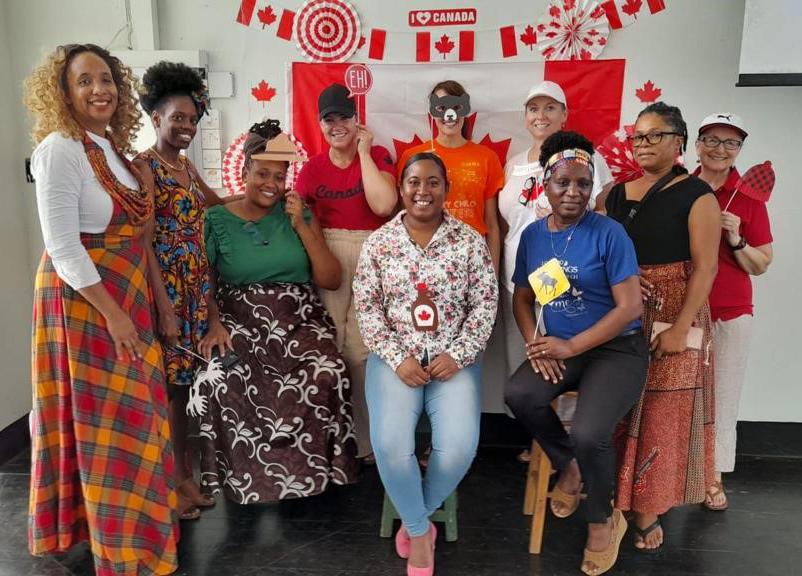
What an opportunity to learn from others, to be fully immersed in another culture — an opportunity for adventure, learning and lifelong impact. While interacting with my Canadian colleagues, I was immediately drawn to the feeling of learning from our differences and yet feeling so connected. I learned about teaching environments, work schedules, and the energy and demands of the teaching job. I learned that sometimes when we think things are greener on the other side, we should maybe look instead at what might be better for me on my side.
As we met with our Canadian colleagues in Ottawa, I was so impressed with the level of professionalism and excitement from the teams. It was thrilling to be in a space of teachers where I could tangibly feel a desire to do their best.
St. Lucia was mind opening. The people have an energy that is almost tangible. My thoughts going in were that we were there to teach people who maybe didn't have the skills or knowledge that Canadian teachers have. I quickly learned how wrong I was.
The teachers of St. Lucia have tenacity, strength, love of families and children, and so much knowledge about teaching their children. I was there simply to facilitate learning in a new way, someone to maybe regenerate some ideas, a new shiny object that might bring some excitement.
This was an equal learning opportunity where I learned just as much as I supported the learning of others. It was a privilege to learn from all the teachers that I encountered. There was a dedication to education and unions, regardless of the struggles or disadvantages that we think a developing country might encompass — each day fresh, each day ready, each participant there to learn.
I am so thankful to have had this opportunity to work with a brilliant CTF team, amazing teachers in St. Lucia, and thankful to the ATA for this magical opportunity that unites teachers worldwide.
- Tamara Franko
Kildare School, Edmonton
A life-changing experience
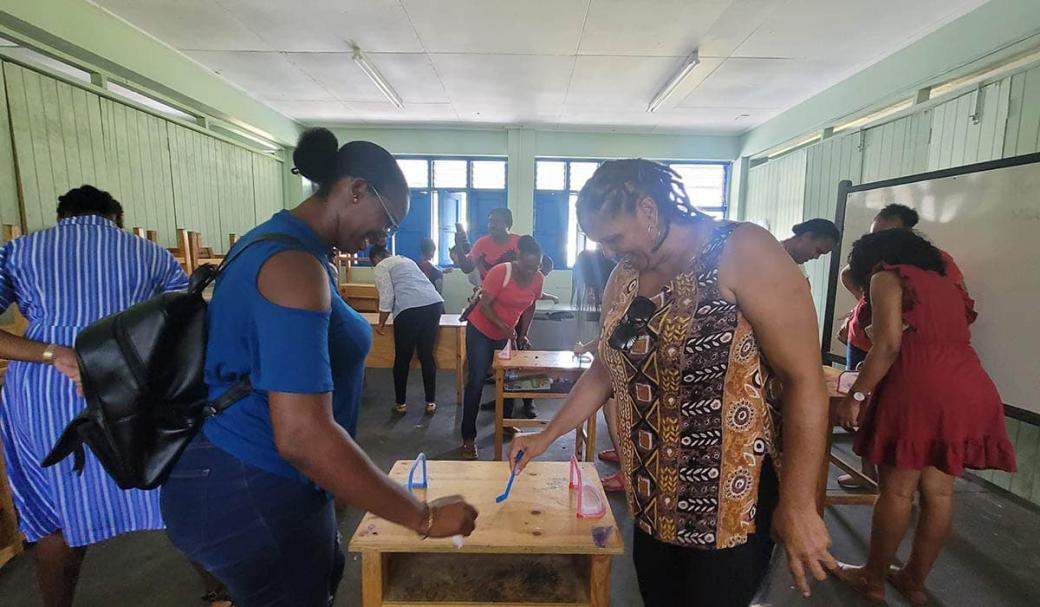
I feel so fortunate to have participated in CTF’s Project Overseas during the summer of 2023. I was selected to be one of four teachers who travelled to the Caribbean island of St. Vincent and the Grenadines. This was an experience of a lifetime and working with the teachers of this beautiful island was life changing.
The executive team of the St. Vincent and the Grenadines Teachers' Union was so welcoming and inviting. My purpose was to team up with my co-tutor Kemarri and deliver eight days of technology workshops. We focused on showing the teachers tools that they could use in their learning environments. I found the experience incredibly rewarding, as the recipients were so passionate about learning and improving their public education system. In turn, they taught me so much about problem solving, relationships and resilience. They continued to surprise me with their enthusiasm, ideas and willingness to continue learning.
My experience provided many highlights but the one that stood out for me was the cultural exchange day. We showed our Caribbean colleagues some important facts about Canada, and in exchange we got to see the exquisite costumes, singing, dancing and drumming of the island of St. Vincent. It was breathtaking and really showed the beauty of the people of this country. Last, we participated in Vincy Mas, a two-day celebration that takes place across the entire island, with cultural music, dancing, food and drink.
This was an experience that I will cherish forever.
- Jenn Hummel
Heloise Lorimer School, Airdrie
Uganda experience is impactful
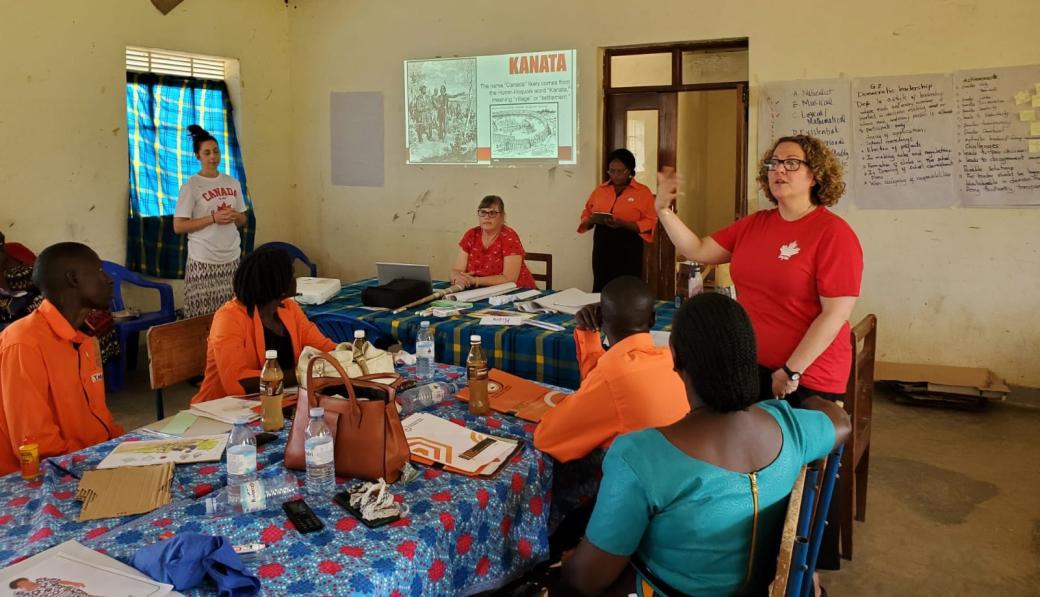
In July 2023, I was able to fulfill a lifelong dream of visiting the continent of Africa. I was fortunate to be part of a team of four teachers from across Canada who travelled to the extremely remote northeastern part of Uganda. The purpose of the project was to provide professional development sessions for teachers and administrators in the Karamoja region.
Along with our Ugandan counterparts, we team-taught two groups of teaching professionals over the course of two weeks. Each Can/Ugan pair delivered seven sessions in one of the following areas: leadership in education, classroom management, instructional strategies and learning styles/modalities. While the trip was exceptionally successful in meeting its purpose, the Canadian team also had a truly unforgettable experience.
We were very honoured by the acceptance and eagerness the participants showed us as we shared our professional knowledge, and as we also shared our culture and life experiences. We were equally grateful to learn about Uganda and, in particular, the unique culturally rich Karamoja region. It was clear that everyone shared a passion for education and a desire to improve the environment and quality of the learning process for both students and teachers.
A highlight for the Canadian team was being able to visit some of the schools where our participants teach and seeing them implement some of what they had learned in our sessions the week before. It was eye opening how caring and resilient the teachers are when faced with huge class sizes and very limited resources.
My personal mantra is “make an impact,” and I’m immensely grateful for the impact this experience had on all parties, especially me!
- Carole Jean-Baptiste
Iron Ridge Intermediate Campus, Blackfalds
Visit to The Gambia provides wonderful memories
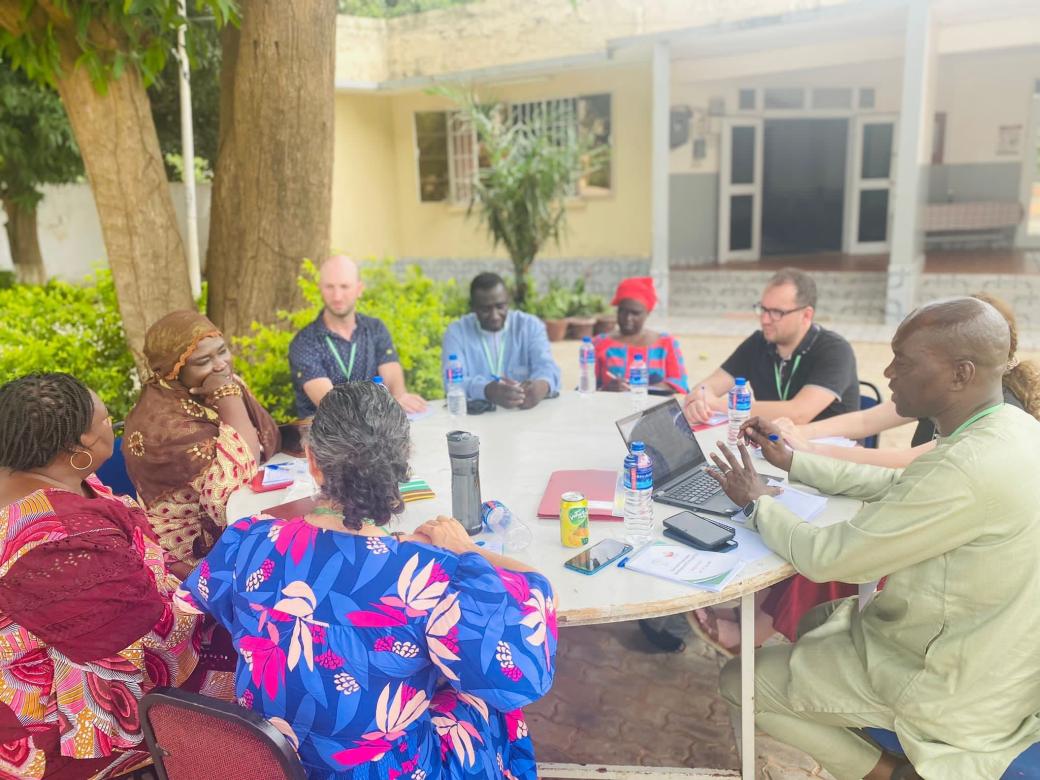
Spend a day in The Gambia and it’s easy to see why the smallest country in continental Africa is referred to as “The Smiling Coast.” Rarely can a visitor walk down any beach or into any shop without a local starting up a conversation with a friendly “you are most welcome here!”
As part of a team of four Canadian teachers who traveled to The Gambia this past summer to participate in the Canadian Teachers’ Federation’s Project Overseas, I was the lucky recipient of this hospitality. Although we were there to work alongside our Gambian Teachers’ Union (GTU) counterparts, the true joy of this program was experiencing the daily life of a different culture, learning as much from the participants of our workshops as we were able to share.
The project consisted of two week-long workshops with topics ranging from union advocacy and activism to gender and sex-based violence to technology and classroom management. As the leadership from the GTU explained, professional development is not a typical experience for Gambian teachers, so participants were eager to connect with one another and discuss their ideas and experiences.
The project is careful to ensure that the host country takes the lead, as they are the experts in their own context and needs. Our team appreciated this approach, as we did not want to perpetuate a western-saviour narrative. Instead, we were privileged to learn alongside two groups of smart, dedicated teachers, each of them with a strong desire to improve their classrooms, the lives of their students and their country as a whole. I left The Gambia with a host of wonderful memories and a renewed belief in the importance of unions in protecting and advocating for public education.
- Kevin McBean
McNally High School, Edmonton
‘I left part of my heart in Ghana’
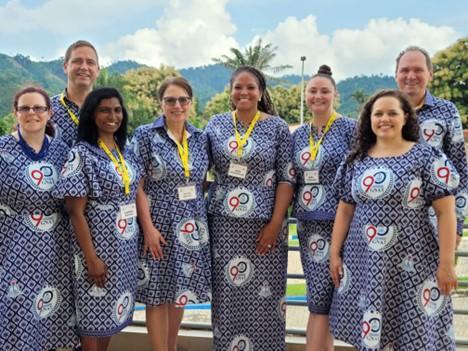
My adventure started in February, when I learned I had been placed on Team 1 for Ghana. Over the next few months I worked with four other team members from all across Canada. As our team lead was able to co-ordinate with the Ghana lead, we learned we would be delivering the topics of inclusive education, gender and equity, technology, and classroom management. I lead the inclusive education team.
After 24 hours of travel, we arrived in Ghana, meeting our contacts Ernest and Kwame. Our hosts were fabulous. On the first night, they’d organized a seamstress to measure us for opening ceremony uniforms, then provided a delightful supper, featuring some familiar and unfamiliar tastes. We then fell into our beds as we had an early wakeup the next morning for a special book launch event.
The morning came early, but we were in great spirits as we learned that the Ghana National Association of Teacher’s (GNAT) book launch was in honour of the 60 years of partnership with the Canadian Teachers’ Federation. The book was authored by Dr. Linus Linnaeus Tannor and details the achievements of previous GNAT/CTF cohorts. As I read about the many initiatives that prior teams had accomplished, I felt such pride at this legacy.
For the next two days we planned in partnership with the Ghana leads. This was the most ambitious project yet, with the most teachers being trained, so we had a tight schedule. After we’d completed our planning, we travelled to Cape Coast, where we delivered two projects to a total of 400 teachers. Then, after another day of travelling, sightseeing and learning the history of the different regions of Ghana, we completed two more sessions in Kibi (pronounced Chi-bi) with 200 members in each session.
Throughout the process, we trained 800 teachers, with the hope that many of those teachers would be able to share information and train others at their school sites. Some of the topics we covered included definitions of inclusion, how to recognize exceptionalities such as learning disabilities, intellectual disabilities, hearing and vision, and gifted students. We then shared some corresponding strategies for each exceptionality.
In Ghana, teachers face many challenges with inclusion due to societal pressures, class size and lack of specialized materials, but it was so heartwarming to see the participants take on the challenge as they moved back to their different schools.
Collaborating at an international level with other teacher’s associations was an incredible opportunity and experience that I will never forget. I left part of my heart in Ghana with all the wonderful GNAT staff and teachers we met along the way.
- Adrienne Peoples-Sprecker
Ecole Plamondon School, Plamondon
West Africa provides inspiration
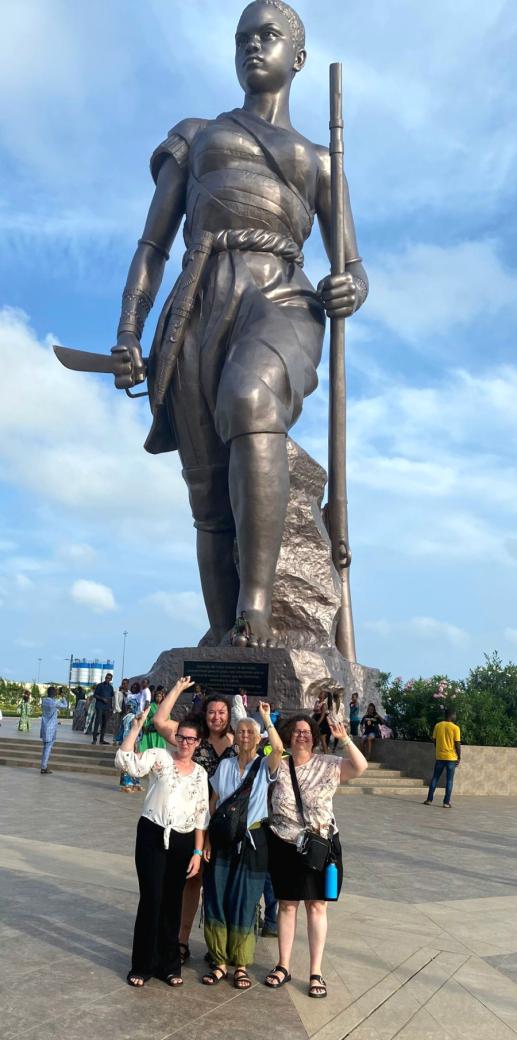
Upon meeting “Team Bénin” for the first time in person before heading to Bénin, West Africa, I was amazed at how well we all got along and complemented each other. Each of the four members on our team brought different experiences and talents to the group. Together, we began the long journey to West Africa (and a quick tour of Paris on a nine-hour layover!).
Our team of women stayed and worked in the country’s largest city, Cotonou. We were in awe as we drove by the 30-foot bronze Amazon statue, called the Benin Amazone, built in homage to the world’s only all-female army. Our hosts, representatives from the national teachers unions Synaem-Benin (Syndicat national des enseignants des écoles maternelles) and SNEP (Syndicat national de l’enseignement primaire public), ensured that we were well taken care of, including hotel accommodations, daily meals and tourist activities on the weekend.
Then came the work: 50 participants each week from all over the country of Bénin, all coming to Cotonou to learn and share teaching strategies and pedagogy. Our Canadian team co-led carousel sessions on classroom management, differentiation, inclusion, gender equity and many more topics.
I was touched by the dedication and engagement of the participants, who not only travelled from afar to join us, but who were willing to stay after the allotted time to continue discussions.
We were welcomed into this country with open arms. The pride and dedication of the teachers we met was unparalleled. The openness of sharing of culture, especially the love of music and dance, was inspiring.
- Heather Skerry
École Coloniale Estates School, Beaumont
Project Overseas a learning experience
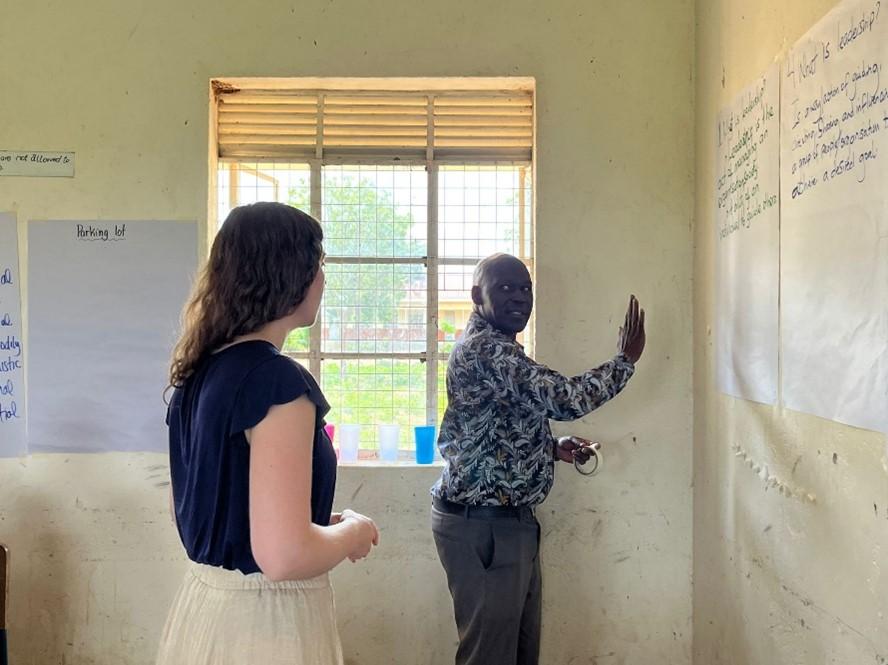
In heading to Uganda this past July with Project Overseas, I was very excited but also worried about facilitating professional development for teachers who work in a context that is very different from my own. This worry was alleviated when my team and I met our co-tutors, the expert Ugandan teacher-trainers with whom we would we working to plan and facilitate this professional development. My co-tutor brought experience in the areas in which I had gaps, and I used my experience to bring some new ideas and perspectives. Together, we built sessions that asked teachers to grow and take risks, but in a way that was meaningful for their Ugandan classrooms. I am proud of the professional development that we created through collaboration and solidarity, which was well-received by participants.
Another highlight of this experience was that the Ugandan teachers had so many different ways of showing appreciation, from a round of applause, to giving imaginary flowers or sodas, to singing a song. They consistently took time to appreciate, not only us as facilitators, but each other as colleagues. This appreciation wasn’t just for a completed task, but also for those who spoke up or took a risk, regardless of the outcome.
Many of the 80 Ugandan teachers who participated in the PD sessions had travelled a significant distance to be there and spent the week away from their families and classrooms. These teachers were open to the new ideas presented during the PD sessions, but also demonstrated strong teaching practices that they already use in their classrooms.
I saw these practices in action when I visited Ugandan schools, where teachers have limited access to instructional materials and classes of over 100 students. Despite these obstacles, these teachers showed that they appreciate professional development opportunities while already employing strategies to move education forward in Uganda.
Although I was in Uganda to co-lead professional development, this experience ended up teaching me so much, and I give endless appreciation to the teacher participants for that.
- Kiara Smyth
St. Francis Xavier Catholic High School, Edmonton
Au Togo, on collabore à gogo
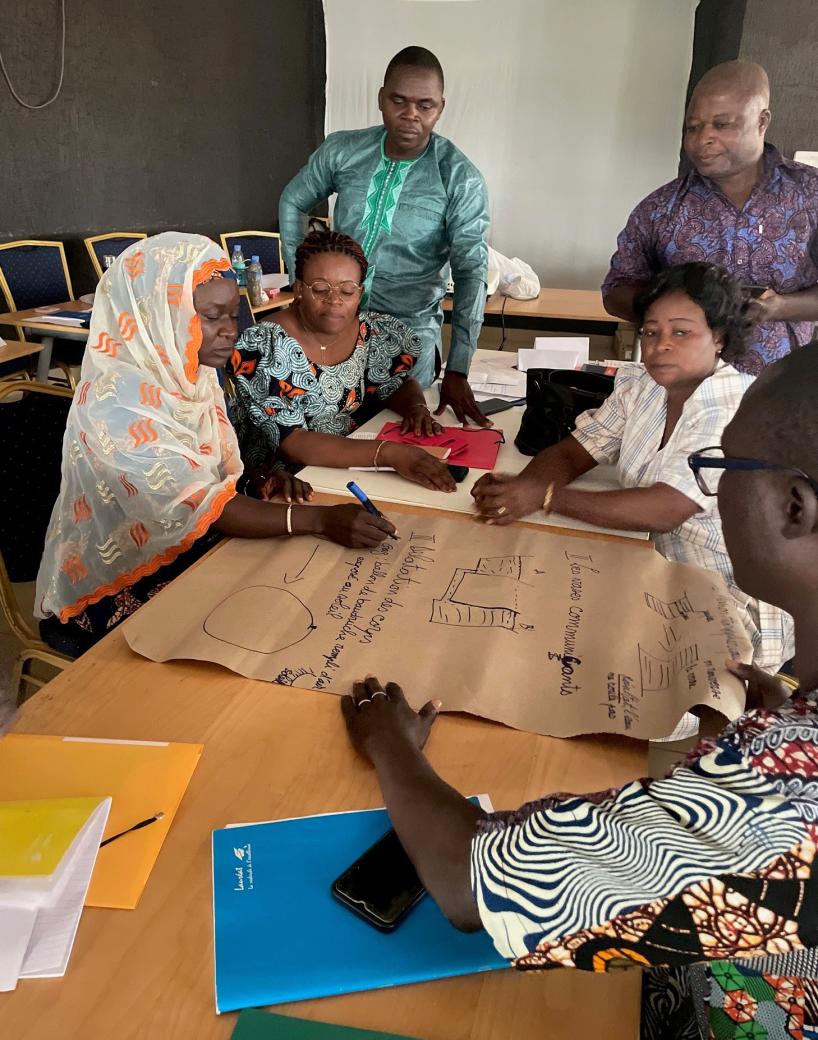
Le Togo est un pays francophone d’Afrique de l’Ouest qu’on appelle aussi « le sourire de l’Afrique ». Dès l’arrivée de mon équipe de professeurs canadiens, nous avons constaté qu’il porte bien son nom!
Mon équipe du Projet outre-mer (PO), composée d’une enseignante du Yukon, de deux enseignants de l’Ontario et de moi-même dans le rôle de cheffe d’équipe, est arrivée à Lomé, capitale du Togo, le 6 juillet. Nous avons tous été accueillis avec le sourire! Lors de notre première réunion avec le personnel de la Fédération des syndicats de l’éducation nationale et les co-formateurs, nous nous sommes immédiatement sentis à l'aise. J’avais aussi participé au PO en 2019, à Sainte-Lucie, mais le Togo est complètement différent. Ce n’est pas un pays touristique; il s’agit d’un des pays en développement de la région. Cependant, le pays a une riche histoire. Il a notamment déjà été une colonie allemande, puis française; son passé a également été marqué par la traite des esclaves.
L’objectif du PO au Togo est de travailler avec (et non pour) les enseignants de la région sur des dossiers qui leur tiennent à cœur, notamment la gestion de classe, l'éducation des filles et le syndicalisme. L'équipe canadienne a travaillé de près avec l’équipe togolaise. Comme on dit à la FCE, la clé est dans le « co » : co-formateurs, collaboration, co-planification, co-enseignement. Leur gestion de classe, avec des groupes formés de 80 à 115 élèves, est excellente. Leur créativité, une nécessité étant donné qu’ils et elles travaillent sans technologie et avec peu de matériel, est sans pareil. Les conditions de travail que nous tenons pour acquises chaque année doivent être réclamées au Togo, parce que les syndicats composent avec beaucoup d’opposition du gouvernement et l’adhésion n’est pas obligatoire. Par contre, nous avons beaucoup en commun avec nos collègues togolais : les défis, les succès et la joie d’enseigner. Je suis rentrée au Canada ayant noué des amitiés et fait le plein d’énergie pour la prochaine année scolaire!
Teaming up in Togo
Togo, a French-speaking country in West Africa, is also known as “the smile of Africa.” Upon arrival, my team of Canadian teachers discovered that it truly lives up to its name!
My Project Overseas (PO) team, consisting of a Yukon-based teacher, two teachers from Ontario and yours truly in the role of team lead, arrived in the capital city of Lomé on July 6 and we were greeted by smiling faces all around! At our first meeting with staff from the Fédération des syndicats de l’éducation nationale (the national federation of education unions) and the cotrainers, we immediately felt at ease. I had also taken part in the 2019 edition of PO in St. Lucia, but Togo is a completely different place. The country doesn’t attract many tourists; it is one of the developing countries in the region. However, the country has a rich history. It was a German colony before being occupied by the French; the slave trade is also a part of its past.
The goal of PO in Togo is to work with (not for) the region’s teachers, focusing on topics of importance to them such as classroom management, girls’ education and organized labour. Members of the Canadian team worked closely with their Togolese counterparts. As we like to say at CTF, the key is in the “co”: cotraining, collaborating, coplanning, coteaching. Their classroom management, with groups made up of 80 to 115 students, is excellent. Their creativity, a must given that they work without access to technology and with very few resources, is unparalleled. The working conditions that we take for granted need to be demanded every year in Togo, since unions face a great deal of government opposition and membership is not mandatory. Nevertheless, we have much in common with our Togolese colleagues: the challenges, successes and joys of teaching. I returned to Canada having made new friends and full of energy for the new school year!
- Monique Wilson
Aurora Academic Secondary School, Edmonton
What is Project Overseas?
A joint endeavour by the Canadian Teachers’ Federation (CTF) and its member organizations, Project Overseas provides professional assistance to fellow teachers in developing countries. The project takes place during the months of July and August.
Started in 1962 with one program in Nigeria, Project Overseas has helped teacher organizations in more than 50 countries in Africa, Asia, the Caribbean and the South Pacific. Since its inception, more than 1,800 Canadian teachers have participated in the program. Currently, approximately 50 volunteers are sent each summer to about a dozen countries.
Application deadline approaching
Nov. 15 is the application deadline for Project Overseas.
More information is available on the ATA website.
